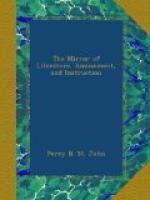uninitiated knew nothing. The square, the line,
the trowel, were not wanting, and the hammer was lying
in front of the chair. Labour, however, was over,
and the time for refreshment having arrived, each of
the stony brotherhood had a flagon before him; and
when we mention that the Saints were Irish, and that
St. Patrick in person was in the chair, it is not to
be wondered at that the mitres, in some instances,
hung rather loosely on the side of the heads of some
of the canonized compotators. Among the company
were found St. Senanus of Limerick, St. Declan of Ardmore,
St. Canice of Kilkenny, St. Finbar of Cork, St. Michan
of Dublin, St. Brandon of Kerry, St. Fachnan of Ross,
and others of that holy brotherhood; a vacant place,
which completed the four-and-twentieth, was left for
St. Colman, who, as every body knows, is of Cloyne;
and he, having taken his seat, addressed the president,
to inform him that he had brought the man. The
man (viz. Larry himself) was awestruck with the
company in which he so unexpectedly found himself;
and trembled all over when, on the notice of his guide,
the eight-and-forty eyes of stone were turned directly
upon himself. “You have just nicked the
night to a shaving, Larry,” said St. Patrick:
“this is our chapter-night, and myself and brethren
are here ’assembled on merry occasion.’—You
know who I am?” “God bless your reverence,”
said Larry, “it’s I that do well.
Often did I see your picture hanging over the door
of places where it is”—lowering his
voice—“pleasanter to be than here,
buried under an ould church.” “You
may as well say it out, Larry,” said St. Patrick;
“and don’t think I’m going to be
angry with you about it; for I was once flesh and blood
myself. But you remember, the other night, saying
that you would think nothing of pulling your master
out of purgatory, if you could get at him there, and
appealing to me to stand by your words.
“Y-e-e-s,” said Larry, most mournfully;
for he recollected the significant look he had received
from the picture. “And,” continued
St. Patrick, “you remember also that I gave
you a wink, which you know is as good, any day, as
a nod—at least, to a blind horse.”
“I’m sure, your reverence,” said
Larry, with a beating heart, “is too much of
a gintleman to hould a poor man hard to every word
he may say of an evening, and therefore”—“I
was thinking so,” said the saint, “I guessed
you’d prove a poltroon when put to the push.
What do you think, my brethren, I should do to this
fellow?” A hollow sound burst from the bosoms
of the unanimous assembly. The verdict was short
and decisive:—“Knock out his brains!”
And in order to suit the action to the word, the whole
four-and-twenty arose at once, and with their immovable
eyes fixed firmly on the face of our hero—who
horror struck with the sight as he was, could not close
his—they began to glide slowly but regularly
towards him, bending their line into the form of a
crescent, so as to environ him on all sides. In




